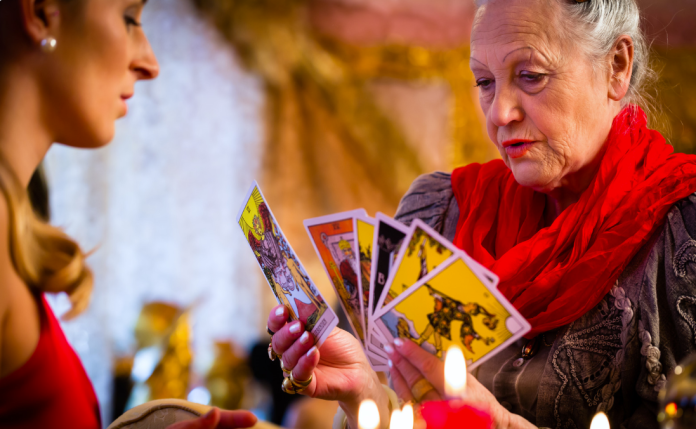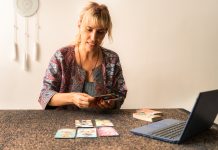Tarot isn’t about predicting the lottery numbers or getting a yes-or-no answer like a magic 8-ball. At its core, tarot is a dialogue—a way to speak with your subconscious, your spirit guides, and the greater energies moving through your life. The secret to unlocking its power lies in how you ask your questions.
Psychics often say: the cards are like a mirror. If you ask shallow questions, you’ll get shallow reflections. Ask deeper, open-ended questions, and the cards reveal profound truths.
So, what does it really mean to ask a good tarot question? Let’s explore how wording can change everything, with fresh ideas you won’t find in ordinary tarot blogs.
Why the Quality of Your Question Matters
A tarot spread doesn’t create your future—it interprets your energy and patterns. If you ask “Will I get a job?” you’re asking for a single snapshot in time. If you ask “What energy should I embody to attract the right job?” you’re opening the door to guidance, action, and empowerment.
One psychic once explained it like this: “The tarot doesn’t like being treated like a vending machine. It wants a conversation.”
The Problem With Yes-or-No Questions
Yes-or-no questions limit the wisdom you can receive. The cards speak in archetypes, metaphors, and stories. When you reduce that to “yes” or “no,” you cut off their richness.
For example:
Instead of “Will my ex come back?” try “What lesson did my relationship teach me, and what’s next for my love life?”
Instead of “Will I be happy?” ask “What steps can I take now to build a more fulfilling life?”
Notice the shift: one traps you in waiting mode; the other empowers you to act.
Creative Tarot Questions That Go Deeper
Here are examples of unique, powerful questions that invite richer answers:
What patterns keep repeating in my relationships, and how can I break them?
What hidden strengths am I underestimating in myself?
How do my ancestors or spirit guides want to support me right now?
What am I avoiding that could transform my situation if I faced it?
Where is my energy being wasted, and how can I redirect it?
Psychics often find that when clients ask these kinds of questions, the cards speak with uncanny clarity.
Story Example: The Job Seeker Who Reframed
A client once came to a psychic asking, “Will I get the promotion?” The reading felt flat—it showed uncertainty and stress. So the psychic encouraged her to reframe: “What can I do to position myself for career growth?”
The new spread revealed practical advice—networking, self-advocacy, and releasing fear of rejection. Weeks later, she didn’t just get the promotion—she landed an even better offer. That’s the magic of a good question.
The Role of Intuition in Asking
Sometimes the best questions aren’t planned. As you shuffle the deck, notice what bubbles up: an image, a worry, a word. That’s your subconscious signaling what needs attention. Psychics often remind clients: “The question chooses you as much as you choose the question.”
Questions to Avoid in Tarot
Not every question opens the door. Here are common pitfalls:
Overly predictive questions: “When will I get married?” locks you into a timeline instead of growth.
Disempowering questions: “Will I fail?” assumes defeat.
Other people’s privacy: “What is my ex thinking?” violates boundaries. A better angle: “How can I heal from this breakup?”
Psychic Insights: Tarot as a Living Conversation
Psychics describe tarot as a living system—each spread is a dialogue between you, the reader, and universal energy. When you treat it as a conversation, not a courtroom, the answers expand.
That’s why psychics often encourage follow-up questions during a session. If a card feels unclear, don’t freeze—ask again: “Can you clarify what this means for my relationships?” The cards respond to curiosity.
How to Practice Asking Better Questions
Start with “What” or “How.” These open the door to guidance.
Avoid absolutes. The future isn’t fixed; it’s fluid.
Focus on yourself. You can influence your path, not control others.
Reframe fear. Instead of “What’s wrong with me?” try “What am I learning right now?”
With practice, you’ll notice your readings feel sharper, more empowering, and—ironically—more accurate.
Final Thoughts: The Power of Asking Well
Tarot doesn’t reward passivity—it rewards curiosity. When you ask thoughtful, empowered questions, the cards act like a compass instead of a coin toss. Psychics know this truth well: the quality of the question shapes the quality of the answer.
So, next time you shuffle the deck, pause. Listen to your intuition. Frame your question like you’re opening a door, not closing one. The cards—and the universe—will meet you there.
Tarot Questions FAQ
1. Can tarot answer yes-or-no questions?
Technically, yes, but it reduces the richness of tarot. Open-ended questions give more useful, layered insights.
2. What’s the best tarot question for love?
Instead of “Will I find love?” ask “What can I do to attract the right relationship?” It empowers you rather than making you wait.
3. Can I ask tarot about my ex?
Yes, but keep it healthy. Ask “What lessons did this relationship teach me?” or “How can I heal and move forward?” instead of prying into their mind.
4. What’s a powerful tarot career question?
Ask “What energy should I embody to grow in my career?” rather than “Will I get the job?” Action-focused questions invite better answers.
5. Can tarot predict exact dates or times?
Not precisely. Tarot shows patterns and timing energies like “soon” or “delays,” but it’s not a cosmic clock.
6. How do I phrase tarot questions clearly?
Start with “What,” “How,” or “Why.” Avoid absolutes like “Will I fail?” Instead ask, “What can I learn from this challenge?”
7. Can I ask tarot about someone else’s thoughts?
Ethically, it’s better to stay in your own energy. Try “What’s the healthiest way for me to approach this relationship?”
8. Can tarot reveal hidden strengths?
Yes. Questions like “What gifts am I underestimating?” highlight talents and qualities you haven’t recognized.
9. Can tarot help with decision-making?
Definitely. Instead of “Should I do this?” ask “What will be the outcome if I choose this path?” to compare energies.
10. Can tarot tell me about my spiritual path?
Yes. Ask “What am I being called to explore spiritually right now?” or “What blocks my connection to intuition?”
11. Can I ask tarot about my health?
You can ask about energy and lifestyle support, like “What can I do to restore balance?” but tarot is not a substitute for medical advice.
12. Can tarot predict marriage?
It can show energy around commitment, but instead of “Will I marry?” ask “What energies surround long-term partnership in my life?”
13. Can I use tarot to ask about money?
Yes. Try “What’s blocking financial flow?” or “What mindset can attract abundance?” rather than “Will I win the lottery?”
14. Can tarot guide me through grief?
Yes. Ask “What message do my guides have to help me heal?” Tarot often brings comforting, compassionate messages.
15. Should I ask tarot daily questions?
Yes, but keep them empowering, like “What energy should I focus on today?” Avoid obsessive checking that creates dependency.
16. Can tarot warn me about danger?
It can highlight cautionary energies, but it’s not meant to create fear. Instead ask, “What can I do to protect and strengthen myself right now?”
17. Can I ask tarot to connect with ancestors or spirit guides?
Absolutely. Try “What guidance do my ancestors want to share with me now?”
18. Can tarot explain recurring life patterns?
Yes. Questions like “Why does this situation keep repeating?” or “What lesson am I missing?” reveal karmic cycles.
19. Can tarot help with creativity?
Yes. Ask “What blocks my creative flow?” or “What inspires me to express myself more fully?”
20. Can tarot show me my soul purpose?
Yes. Try “What am I here to learn in this lifetime?” or “What gifts am I meant to share with the world?”





This article provides an insightful and balanced perspective on the use of tarot cards. It’s refreshing to see an emphasis on self-reflection and personal growth rather than using tarot as a predictive tool. Focusing on ethical and constructive questions can truly help individuals gain clarity and direction in their lives. Excellent read!
This article should be retitled, ‘Tarot Cards: The Gentle Art of Asking Pointless Questions.’ Seriously, what’s left to ask after ruling out anything actually interesting or relevant?
The perspective offered in this article about the use of tarot cards is refreshingly rational and grounded. While some may view tarot as a mystical conduit for absolute truths, this piece rightly emphasizes the importance of setting realistic expectations. Asking tarot cards about deeply personal or future-bound topics (such as health or court cases) is not only unproductive but also ethically dubious. Instead, self-reflective inquiries that guide personal growth resonate more with the true essence of tarot as a tool for introspection. However, the article could delve deeper into how to frame these self-focused questions to maximize the benefits of a reading.
The article provides a thorough guide on the dos and don’ts of tarot questioning. Such specific and clear advice can really help individuals get the most out of their readings. Excellent resource!
This article offers a comprehensive and nuanced perspective on how to ask effective questions during a tarot reading. It rightly highlights that the focus should be on self-improvement rather than seeking definitive answers about others or unpredictable events like lottery numbers. The emphasis on ethical questioning and the appropriateness of open-ended questions serve as a valuable guide for anyone looking to gain meaningful insights from their tarot experience.
While I agree with the article’s guidelines, I wonder how individuals can practice asking more empowering questions. Any thoughts or tips?
The article serves as a useful reminder to keep tarot questions focused on personal growth and ethical considerations. A good read for those new to tarot.
I find this article incredibly insightful and practical. It takes away the mysticism often associated with tarot and grounds it in self-improvement and personal growth. Very empowering!
It’s intriguing to consider how one’s approach to questioning can impact the effectiveness of a tarot reading. The article does a good job of delineating this.
I agree. The specificity of questions really does matter and can change the outcome of a reading.
Indeed, vague questions can lead to equally vague answers. It’s about being precise and introspective.
Oh great, another guide on how NOT to use tarot cards. What’s the point of consulting them if you can’t even ask what you really want to know? Maybe we should ask the cards how they feel about being so limited.
This piece highlights the limitations of tarot readings effectively. It’s refreshing to see an emphasis on ethical and self-focused questions.
Why even bother with tarot cards if they can’t answer anything useful, like winning the lottery or health questions? This just seemed like a long list of things tarot can’t do.
The article provides a thorough guide on what not to ask during a tarot reading. The key takeaway is to focus on self-improvement and clear, ethical questions.
Absolutely, focusing on actionable questions about oneself can lead to more meaningful insights from a tarot reading.
Yes, it’s important to approach tarot with the right mindset, focusing on personal growth rather than external factors.